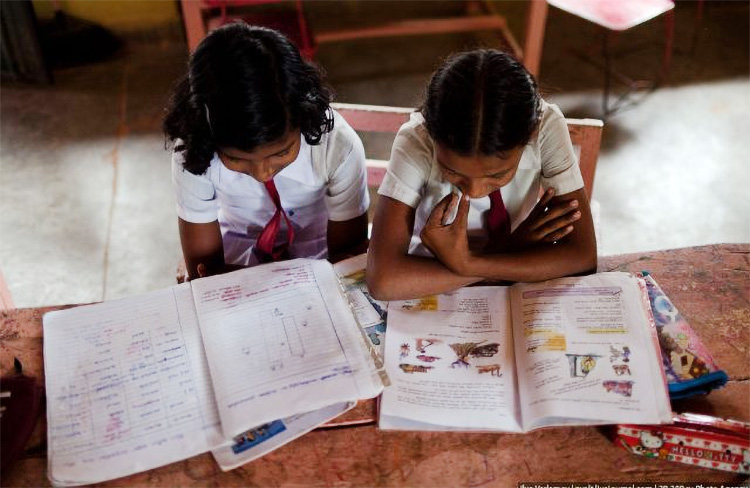Business
Edtech for marginalised children in Sri Lanka: Insights from MENA and other Asian countries

 By Himani Vithanage
By Himani Vithanage
Written for International Day of Education on 24 January 2024.
This blog explores how technological resources can help fill gaps in access and reduce inequalities in education in Sri Lanka.
Despite the recent uptake of educational technology (edtech) in Sri Lanka, it does not cater to the needs of diverse groups of vulnerable children in the country.
Evidence from MENA and Asia reveals the importance of targeted edtech initiatives in ensuring inclusiveness in education in Sri Lanka.
The COVID-19 pandemic and the ongoing economic crisis have resulted in over two years of learning loss in Sri Lanka, with its effects being more on vulnerable children due to the gaps in inclusiveness in education.
Access to inclusive and equitable quality education is a fundamental human right. It is crucial for achieving developmental goals like ending poverty and helping people move up in society.
The United Nations marks this year’s International Day of Education under the theme “learning for lasting peace” highlighting the important role played by inclusive and equitable education in the sustenance of peace and development.
However, the path to achieving equitable access to quality education by 2030 seems challenging, with only 1 in 6 countries projected to reach this goal. This underscores the need to reconsider current education systems, specifically across the developing world. In Sri Lanka, despite having achieved near-universal participation in education, there is still a long way to go in achieving equitable education for vulnerable groups such as children with disabilities, out-of-school children, school dropouts, migrant workers’ children, children from minority communities etc.
A recent regional study conducted by IPS highlights examples from the Middle East and North Africa (MENA) and Asia on how technology can be used to bridge these gaps. However, the study reveals that compared to several other lower middle-income countries analysed within South Asia, Southeast Asia and MENA, Sri Lanka is not fully catering to the diverse educational needs of vulnerable children through its use of technology. This blog explores how Sri Lanka could use technology innovatively to improve inclusiveness in education.
‘Edtech’
 Edtech, short for educational technology, is the use of technology in education to facilitate the teaching and learning processes. These encompass hardware, software, infrastructure, and other digital content that are used for educational purposes. Some examples of edtech include E-learning platforms, learning management systems (LMS), virtual classrooms, educational apps, educational games, educational television channels, and education management information systems (EMIS).
Edtech, short for educational technology, is the use of technology in education to facilitate the teaching and learning processes. These encompass hardware, software, infrastructure, and other digital content that are used for educational purposes. Some examples of edtech include E-learning platforms, learning management systems (LMS), virtual classrooms, educational apps, educational games, educational television channels, and education management information systems (EMIS).
The uptake of edtech has grown over time, particularly during and after the COVID-19 pandemic which highlighted the important role played by technology in strengthening the resilience of education systems to crises and emergencies. After the pandemic in particular, with technology becoming more accessible to users, new edtech initiatives have been developed while expanding the coverage of existing ones.
Several edtech initiatives in the MENA region are being deployed to improve access to education for underrepresented and vulnerable groups. For instance, the UNRWA eLearning Platform is a digital learning hub, that provides access to remote learning material and resources specifically for Palestinian refugee students. This platform was developed with the aim to ensure continuity of learning, especially during times of crises such as the COVID-19 pandemic and is an ideal example of the use of edtech in improving the inclusivity of education.
‘Sghartoon’ in Tunisia is a digital teletherapy platform that is designed to help children with learning disabilities such as dyslexia, through educational games. This platform enables therapists to manage the therapeutic path of children through its digital game library, patient management and calendar management tools.
Similarly, Asia boasts several successful initiatives like the ‘Basic Education Equivalency Program (BEEP)’ in Cambodia, an online programme, that targets young Cambodians who have dropped out of lower secondary school and supports them in completing their basic education online without disrupting their work.
In Pakistan, the ‘WonderTree’ programme provides therapeutic exercises for children with special needs through Augmented Reality (AR) based games, catering to the educational needs of children from various spectrums of motor and cognitive difficulties including Autism, Down Syndrome, and Global Development Delay. This is an instance of using edtech as a technology-enabled behavioural intervention that enhances the psychological well-being of students, illustrating the significant contribution that edtech can make to learning beyond conventional classroom settings.
While lack of access to education infrastructure in rural schools in India is an ongoing challenge, ‘OLabs’ (online labs for schools) is an initiative that targets children from underprivileged schools by making lab resources available readily (anytime) and remotely (anywhere) to students with no access to physical labs or where equipment is not available in their schools due to scarcity or cost. This initiative serves as an example of using technology to improve access to education infrastructure in rural schools.
There has also been a recent emergence of offline tech in certain countries, where some edtech programmes have been specifically developed to reduce the digital divide in education. Such edtech programmes do not require internet or electricity. One such example is the ‘Class Saathi’ initiative in South Korea and India which uses Bluetooth clickers to provide students and teachers from underprivileged areas lacking proper ICT infrastructure (internet and electricity) to access online content using offline and wireless technology. Such initiatives are innovative solutions that would enhance accessibility to edtech.
Lessons for Sri Lanka
While Sri Lanka still has much to achieve in terms of inclusiveness and equitability of education, these regional examples demonstrate how edtech can be used to capture the varied groups of vulnerable children including children from various spectrums of learning disabilities, out-of-school children, school dropouts, migrant workers’ children, children from minority communities etc. Therefore, the focus should be directed towards developing targeted edtech initiatives that are specifically designed to address the needs of particular groups of children to ensure the inclusiveness of quality education through edtech. Some progress has been made in this regard, although there is a long way to go.
One important example in Sri Lanka is the ‘Nenasa’ programme which makes educational content available to rural students through its TV programmes, developed to reduce the urban-rural gap in access to educational material. Implementing such targeted initiatives would be a vital step in the progress of Sri Lanka’s education system.
As there is mixed evidence on the role of technology in reducing disparities in education, especially because of the digital divide, promoting the use of offline tech is also a possibility for Sri Lanka as evident from the Class Saathi initiative.
Despite the government’s recent efforts to improve access to technology in facilitating edtech, that solely is insufficient and ineffective in improving inclusiveness in education. Rather, targeted, strategic and innovative measures should be taken to ensure that the implementation of edtech is effective in promoting inclusiveness in education for marginalised and vulnerable groups of children in Sri Lanka. Furthermore, in addition to introducing such targeted edtech initiatives, it should be followed by providing adequate teacher pre-service and in-service training to ensure the effective incorporation of technology in education.
* This blog is based on the IPS study ‘EdTech: Landscape and Challenges in Asia and MENA’. It is funded by IDRC through Southern Voice and the Group for the Analysis of Development (GRADE).
Himani Vithanage is a Research Assistant working on health, education, and labour policy at IPS. She received the IPS’ Saman Kelegama Memorial Research Grant for 2021. Himani holds a BA in Economics with First Class Honours from the University of Colombo. Himani also holds a BSc in Economics and Finance with First Class Honours from the London School of Economics and Political Science (LSE).
Business
AHK Sri Lanka champions first-ever Sri Lankan delegation at Drupa 2024

The Delegation of German Industry and Commerce in Sri Lanka (AHK Sri Lanka) proudly facilitated the first-ever Sri Lankan delegation’s participation at Drupa 2024, the world’s largest trade fair for the printing industry and technology. Held after an eight-year hiatus, Drupa 2024 was a landmark event, marking significant advancements and opportunities in the global printing industry.
AHK Sri Lanka played a pivotal role in organising and supporting the delegation, which comprised 17 members from the Sri Lanka Association for Printers (SLAP), representing eight companies from the commercial, newspaper, stationery printing, and packaging industries. This pioneering effort by AHK Sri Lanka not only showcased the diverse capabilities of Sri Lanka’s printing sector but also facilitated vital bilateral discussions with key stakeholders from the German printing industry.
Business
Unveiling Ayugiri: Browns Hotels & Resorts sets the stage for a new era in luxury Ayurveda Wellness

In a captivating reimagining of luxury wellness tourism, Browns Hotels & Resorts proudly unveiled the exquisite Ayugiri Ayurveda Wellness Resort Sigiriya. This momentous occasion, celebrated amidst a vibrant and serene grand opening on the 6th of June, heralds a new chapter in the Ayurveda wellness tourism landscape in Sri Lanka. Nestled amidst 54 acres of unspoiled natural splendour, Ayugiri features 22 exclusive suites and stands out as the only luxury Ayurveda wellness resort in the country offering plunge pools in every room, rendering it truly one-of-a-kind.
The grand opening of Ayugiri Ayurveda Wellness Resort was an enchanting event, where guests were captivated by the melodies of flutists and violinists resonating through Sigiriya’s lush landscapes. As traditional drummers and dancers infused the air with vibrant energy, Browns Hotels & Resorts’ CEO, Eksath Wijeratne, Kotaro Katsuki, Acting Ambassador for the Embassy of Japan and General Manager, Buwaneka Bandara, unveiled the resort’s new logo, marking a significant moment witnessed by distinguished guests from the French Embassy, Ayurveda and wellness enthusiasts along with officials from the Sigiriya area, LOLC Holdings and Browns Group.
“Our strategic expansion into wellness tourism with Ayugiri Ayurveda Wellness Resort Sigiriya symbolises a significant milestone for Browns Hotels & Resorts. Wellness tourism has consistently outperformed the overall tourism industry for over a decade, reflecting a growing global interest in travel that goes beyond leisure to offer rejuvenation and holistic well-being. By integrating the timeless wisdom of Ayurveda with modern luxury, we aim to set a new standard in luxury wellness tourism in Sri Lanka. Whether your goal is prevention, healing, or a deeper connection to inner harmony, Ayugiri offers a sanctuary for holistic well-being” stated Eksath Wijeratne.
Ayugiri encapsulates the essence of life, inspired by the lotus flower held by the graceful queens of the infamous Sigiriya frescoes. Just as the lotus emerges from the murky depths, untainted and serene,
Ayugiri invites guests on a journey of purity and rejuvenation, harmonised with a balance of mind, body and spirit, the essence of nature, echoes of culture and the wisdom of ancient Ayurvedic healing.
Business
HNB General Insurance recognized as Best General Bancassurance Provider in Sri Lanka 2024

HNB General Insurance, one of Sri Lanka’s leading general insurance providers, has been honored as the Best General Bancassurance Provider in Sri Lanka 2024 by the prestigious Global Banking and Finance Review – UK.
The esteemed accolade underscores HNB General Insurance’s unwavering commitment to excellence and its outstanding performance in the field of bancassurance. Through dedication and hard work, the HNB General Insurance team has continuously endeavored to deliver innovative insurance solutions, cultivate strong relationships with banking partners, and provide unparalleled service to customers nationwide. This recognition is a testament to the team’s dedication and relentless pursuit of excellence in the bancassurance business.
“We are honored to receive this prestigious award, which reflects our team’s tireless efforts and dedication to delivering value-added insurance solutions and exceptional service through our bancassurance partnerships,” said Sithumina Jayasundara, CEO of HNB General Insurance. “This recognition reaffirms our position as a trusted insurance provider in Sri Lanka and motivates us to continue striving for excellence in serving our customers and communities.”












